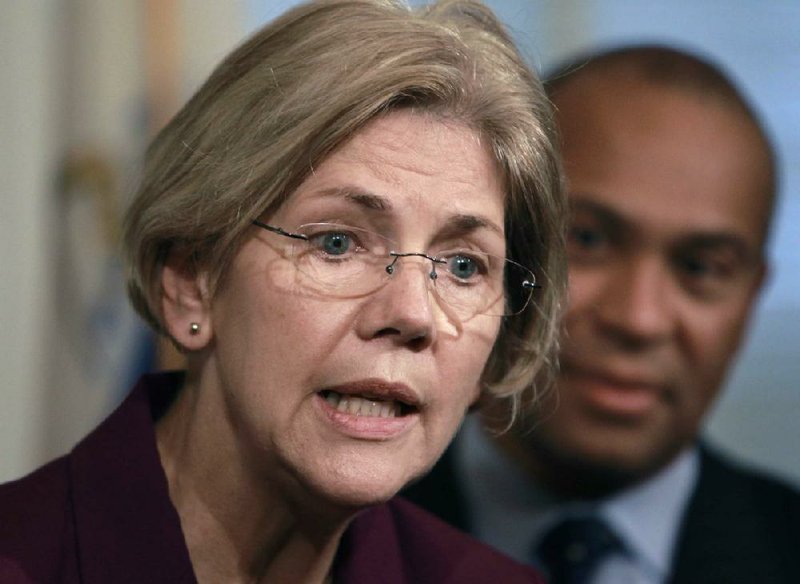LITTLE ROCK — Last year, Elizabeth Warren left Washington after failing to gain enough support in the U.S. Senate to be confirmed as director of the new consumer financial protection agency she championed.
Now, Warren, a Harvard University law professor and self-styled “cop on the beat” who wants to protect consumers from Wall Street, will return to the U.S. capital as senator herself just as Congress opens debate on the first revisions to the landmark Dodd-Frank Act enacted in response to the 2008 financial crisis.
As a senator, Warren will gain a bully pulpit and a vote — powerful tools in the debate over whether and how to re- regulate banks and bankers. And the post comes with a secret weapon: the unofficial prerogative of a senator to single-handedly place “holds” on legislation or nominations.
The question in Washington is whether Warren will come back as a partisan warrior or adopt the milder manner needed for deal-making and legislating.
“The issue is whether her strong views will be tempered by the need to get things done,” said Ernest Patrikis, a partner at White & Case LLP and a former Federal Reserve Bank of New York lawyer. “It is one thing to criticize; it is another to become an effective legislator.”
In Tuesday’s election, Warren vanquished incumbent Republican Scott Brown by a margin of 54 percent to 46 percent to become the first woman senator from Massachusetts and heir to the seat held for 47 years by U.S. Sen. Edward Kennedy, a Democrat.
Warren, 63, ran for Senate after President Barack Obama decided not to nominate her as director of the Consumer Financial Protection Bureau, a Dodd-Frank centerpiece designed to help protect ordi- nary Americans from shoddy financial products. Warren championed the idea as a lawyer and worked as an Obama administration adviser after the law’s passage to help build the agency from scratch.
The banking and financial services industry fiercely opposed establishment of the bureau and Senate Republicans banded together to block her nomination as director.
Along the way, Warren became a favorite of the Democratic party’s liberal wing. Winning a prime-time speaking role at the party’s national convention, she used the opportunity to highlight her anti-Wall Street credentials and warn that the industry was far from abashed about the damage from the financial crisis.
“Wall Street CEOs — the same ones who wrecked our economy and destroyed millions of jobs — still strut around Congress, no shame, demanding favors, and acting like we should thank them,” Warren said at the convention. “Anyone here have a problem with that? Well, I do.”
In interviews after her victory, Warren struck a more moderate tone, pledging to reach across ideological divides.
“I come there for the same reasons I went before, and that is to work for people who need someone to speak out for them,” Warren said Wednesday in an interview on MSNBC’s Morning Joe. “I’ll work with anyone — and I really do mean that — Democrat, Republican, independent, Libertarian, contrarian, vegetarian.”
Warren is expected to seek a seat on the Senate Banking Committee, which would give her a direct role in writing legislation affecting the financial services industry including revisions to Dodd-Frank.
For instance, Republican lawmakers have called for changing the consumer bureau into a five-member commission, which would dilute the power of its director. They also want to subject the agency to the congressional appropriations process, which would give lawmakers more control over its funding. Those changes had gained some support from Democrats in recent weeks.
Richard Hunt, president of the Consumer Bankers Association, said Warren’s attachment to the bureau could alter that debate and make her the key player in any such proposals.
“I have no doubt in my mind that any changes on consumer financial regulation will have to go through Elizabeth Warren’s office,” Hunt said.
A decision on whether she will get on Senate Banking will not come until at least January and isn’t a sure bet, according to a senior Democratic aide on the committee. Other senators with more seniority are in line ahead of Warren and it is still unclear how many openings there will be, said the aide, who requested anonymity because the deliberations are private.
Whether or not Warren is named to the Banking panel, she is expected to become the leading Dodd-Frank defender in Congress, said James Ballentine, executive vice president of congressional relations at the American Bankers Association.She certainly will want to have a voice in what happens,” Ballentine said.
In her victory speech this week, she suggested that she continues to see consumers and Wall Street as adversaries.
“You took on the powerful Wall Street banks and special interests and let them know you want a senator who will be out there fighting for the middle class all of the time,” she told her supporters.
Camden Fine, president and chief executive of the Independent Community Bankers of America, said Warren has cultivated ties to community bankers in part because she sees smaller banks that focus on deposit-taking and commercial lending as allies against Wall Street behemoths. He suggested that she might mellow some of her positions once she begins working in the Senate.
“The fact that she was willing to work with us on certain issues would certainly bode well,” Fine said. “But I have no idea how the dynamics of the Senate will change her views in her second life in Washington.”
Some think she will continue her campaign to protect little guys from the big banks.
“She is going to be a populist,” said Stephen Myrow, a former Treasury Department official who is now managing director of ACG Analytics, an investment research firm. “She is not going to be about getting legislation through. She is going to be about embracing the power of the microphone.”
Information for this report was contributed by Robert Schmidt of Bloomberg News.
Business, Pages 71 on 11/11/2012

